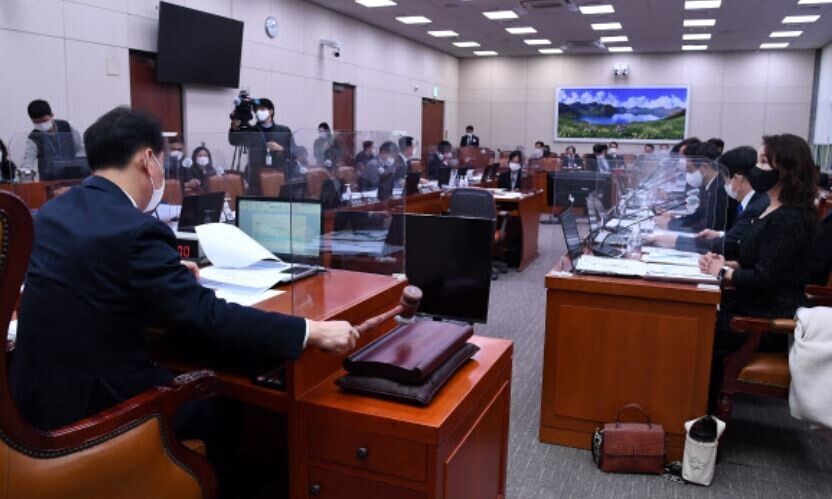hankyoreh
Links to other country sites 다른 나라 사이트 링크
National Assembly committee OKs S. Korea’s entrance to world’s largest free trade pact

The National Assembly Foreign Affairs and Unification Committee voted Wednesday to ratify the Regional Comprehensive Economic Partnership (RCEP), which has been called the world’s biggest free trade agreement.
Once the ratification passes the assembly’s plenary session, the agreement is expected to go into effect around early February 2022.
In a plenary session Wednesday afternoon, the foreign affairs committee voted to approve the RCEP ratification in its original form.
The participants in the agreement now include the 10 members of the Association of Southeast Asian Nations (ASEAN), South Korea, China, Japan, Australia and New Zealand. While South Korea, Indonesia, Malaysia, Myanmar, and the Philippines have yet to complete their parliamentary ratification procedures, six other ASEAN countries and four non-ASEAN countries have done so, satisfying the conditions for the agreement to take effect.
The agreement is set to officially go into effect on Jan. 1 of next year.
The 15 countries party to the agreement accounted for a combined gross domestic product of US$25.6 trillion as of 2019 — or 30% of global GDP — and a combined population of 2.26 billion people, or 30% of the world’s population.
While lawmakers approved the ratification plan as a “nonpartisan measure” at Wednesday’s meeting, they were also sternly critical of the fact that the South Korean government only presented the ratification bill to the National Assembly a full year after it signed the agreement in November 2020.
“Even if [the ratification bill] gets passed in the plenary session [on Thursday], it takes 60 days for it to go into effect, which means it could only do so by around early February,” said People’s Party lawmaker Lee Tae-kyu.
“In other countries, the RCEP starts on Jan. 1 of next year. That means at least a month during which we won’t be able to enjoy tariff benefits,” he noted.
In response, Jeon Yoon-jong, director of the trade negotiation office of the Ministry of Trade, Industry and Energy, stressed that South Korea had “carried out the most stringent domestic procedures among the 15 countries.”
“We commissioned research for around five months, and we had experts evaluating what impact an enormous agreement like the RCEP would have on our industry and economy,” he added.
By Kim Ji-eun, staff reporter
Please direct questions or comments to [english@hani.co.kr

Editorial・opinion
![[Column] Park Geun-hye déjà vu in Yoon Suk-yeol [Column] Park Geun-hye déjà vu in Yoon Suk-yeol](https://flexible.img.hani.co.kr/flexible/normal/500/300/imgdb/original/2024/0424/651713945113788.jpg) [Column] Park Geun-hye déjà vu in Yoon Suk-yeol
[Column] Park Geun-hye déjà vu in Yoon Suk-yeol![[Editorial] New weight of N. Korea’s nuclear threats makes dialogue all the more urgent [Editorial] New weight of N. Korea’s nuclear threats makes dialogue all the more urgent](https://flexible.img.hani.co.kr/flexible/normal/500/300/imgdb/original/2024/0424/7317139454662664.jpg) [Editorial] New weight of N. Korea’s nuclear threats makes dialogue all the more urgent
[Editorial] New weight of N. Korea’s nuclear threats makes dialogue all the more urgent- [Guest essay] The real reason Korea’s new right wants to dub Rhee a founding father
- [Column] ‘Choson’: Is it time we start referring to N. Korea in its own terms?
- [Editorial] Japan’s rewriting of history with Korea has gone too far
- [Column] The president’s questionable capacity for dialogue
- [Column] Are chaebol firms just pizza pies for families to divvy up as they please?
- [Column] Has Korea, too, crossed the Rubicon on China?
- [Correspondent’s column] In Japan’s alliance with US, echoes of its past alliances with UK
- [Editorial] Does Yoon think the Korean public is wrong?
Most viewed articles
- 1‘We must say no’: Seoul defense chief on Korean, USFK involvement in hypothetical Taiwan crisis
- 2‘Weddingflation’ breaks the bank for Korean couples-to-be
- 3[Reportage] On US campuses, student risk arrest as they call for divestment from Israel
- 4[Column] Park Geun-hye déjà vu in Yoon Suk-yeol
- 5Amnesty notes ‘erosion’ of freedom of expression in Korea in annual human rights report
- 6Korea sees more deaths than births for 52nd consecutive month in February
- 7N. Korean delegation’s trip to Iran shows how Pyongyang is leveraging ties with Moscow
- 8Will NewJeans end up collateral damage in internal feud at K-pop juggernaut Hybe?
- 9[Guest essay] The real reason Korea’s new right wants to dub Rhee a founding father
- 10N. Korean hackers breached 10 defense contractors in South for months, police say